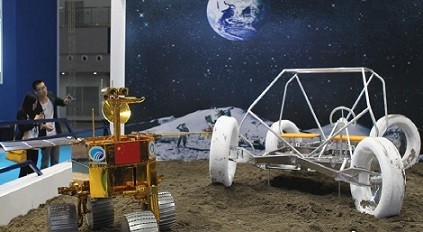China is getting closer to fulfilling its space goals as it has developed the manufacturing techniques for a key part of its super-heavy rocket that will enable sending manned missions to the moon, China Daily reported.
According to a statement released by China Aerospace Science and Technology Corp., the country's major space contractor, a super-large interstage ring developed by the China Academy of Launch Vehicle Technology, in collaboration with other Chinese institutes, will be used to connect stages of the rocket called the Long March 9.
The statement said that the interstage ring is a major component in a multistage rocket. The rings used on China's current rockets were made in sections before being assembled, while the ring on the Long March 9 will be made through a casting method that produces it in one piece.
The report said that the China Academy of Launch Vehicle Technology has started preliminary research on the Long March 9 and the work had been approved by the State Administration of Science, Technology and Industry for National Defense, which is in charge of the nation's space programs.
Sources said that the academy plans to take up to five years to design and develop a liquid oxygen/kerosene engine with 460 metric tons of thrust and an oxygen/liquid hydrogen engine with 220 tons of thrust.
The rocket, which has a launch weight of 3,000 tons, will make its maiden flight around 2030, the sources said, adding that it will play a key role in helping to land astronauts on the moon.
The report, however, said that the Long March 9's technical specifications are not available.
But Li Tongyu, head of aerospace products at the academy, said that the rocket's diameter and height will be much greater than those of the Long March 5, which is undergoing final tests and will make its first flight soon. Li added that the Long March 9's thrust will also be much stronger.
"Our current launch vehicles, including the Long March 5, will be able to undertake the country's space activities planned for the next 10 years, but they will not have the capacity to carry out the nation's long-term space programs," Li said.
Li Jinghong, deputy chief designer of the Long March 3A at the academy, said that the Long March 5 needs to undertake four launches before fulfilling a manned lunar mission based on technical estimates, while the Long March 9 will need only one. He also said that the Long March 9 will not be used solely for lunar missions, but also for other deep-space exploration projects.
The country has also started preliminary research on a Mars exploration program, Tian Yulong, secretary-general of the China National Space Administration, said.



























